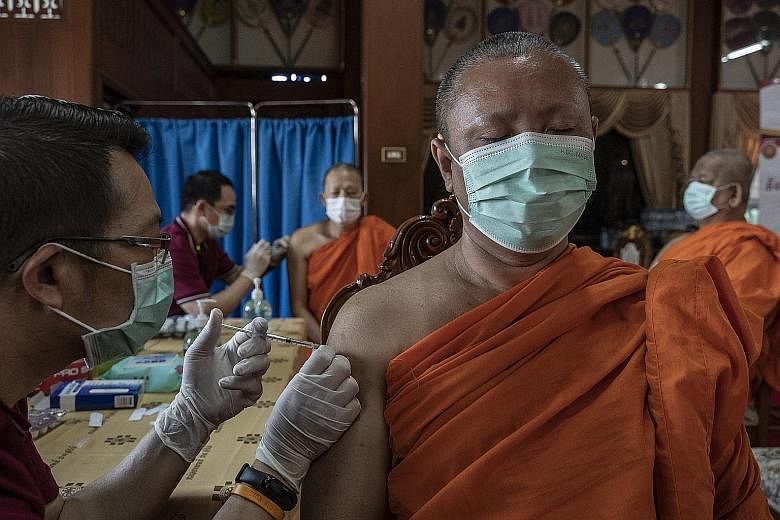LONDON • Growing worries that AstraZeneca's Covid-19 vaccine causes rare blood clots could hinder immunisation campaigns around the world.
Reviews by British and European Union regulators finding potential links to the unusual side effects are another blow for the shot, a cheaper and easier-to-deploy product that many nations are counting on to end the pandemic.
Safety concerns could shake confidence in the jab, though regulators have said its benefits outweigh the risks. Many regions are turning their attention to shots from Johnson & Johnson and developers elsewhere, but demand is still far outstripping supply.
"Better Astra than nothing," said Dr Michael Kinch, a drug development expert and associate vice-chancellor at Washington University. "In an undervaccinated country, I think you have no choice but to take it."
Britain on Wednesday recommended that people aged under 30 should be offered alternatives, and countries across the EU have also imposed age restrictions.
Those beyond Europe are watching closely too. Australia is recommending against giving the shot to anyone aged under 50. South Korea has halted AstraZeneca vaccination for those under 60. And the Philippines is opting for similar age restrictions.
There is a lot at stake, with AstraZeneca's vaccine accounting for almost a quarter of the total supply deals signed for this year.
Covax, an initiative designed to level global access that is backed by groups including the World Health Organisation (WHO), is highly reliant on the vaccine. Shots from Pfizer and Moderna are more costly and harder to store.
The bigger dilemma for lower-income countries is that they are not getting the supplies they need, said Associate Professor Birger Forsberg from the Karolinska Institutet in Stockholm.
Regulators believe the vaccine is safe and effective and are leaving it up to individual countries to make their own decisions.
For many countries, there are not many alternatives. Those in Africa, such as Namibia and Senegal, said they will go ahead with plans to use the vaccine, pointing to regulators and the WHO's backing of the shot.
Britain's move to avoid giving the shots to young adults follows an evaluation by its Medicines and Healthcare Products Regulatory Agency that evidence of a link between the vaccine and the sometimes deadly clots is "stronger, but more work is still needed".
AstraZeneca said it is studying the individual cases.
British health officials described the clotting syndrome as similar to a rare side effect of treatment with heparin, an anticoagulant, in which the body forms antibodies against blood platelets.
The European Medicines Agency said that unusual blood clots with low platelets should be listed as a very rare side effect.
The agency's analysis was based on a review of 86 instances that had been reported as at March 22, including 18 fatalities. Some 25 million people had received the shot in Europe by that point. On Sunday, there were 222 reported instances of that type of clotting, out of about 34 million people.
So far, most of the cases have occurred in women under the age of 60 within two weeks of vaccination.
The events generally occurred after people received their first dose.
Instances of the clotting condition in these women were 20 times higher than would normally be expected, Dr Christian Bogdan, a member of Germany's vaccine committee, said on Wednesday.
Many countries have significantly younger populations, potentially pointing to a higher risk of the clotting, even if it remains very rare.
For now, it is unclear how the data will be interpreted globally, particularly in developing nations that have been banking on widespread use of the shot.
"I believe that the epidemiological data shows that the natural infection is far worse than the severity of the side effects of the vaccine," Washington University's Dr Kinch said.
BLOOMBERG, REUTERS

